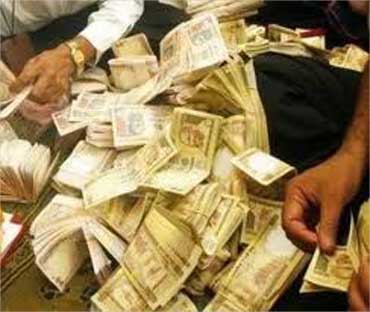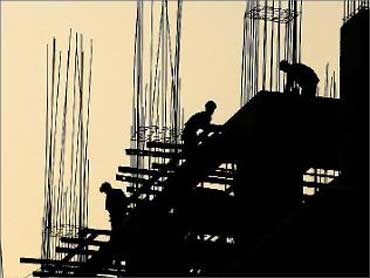
As other developing nations step up their efforts to woo investors through easy access to capital and a simplistic way of doing business bereft of any red tape and corruption, international businesses may view India as less conducive to carrying out business compared to other developing nations.
According to the report, The Drivers and Dynamics of Illicit Financial Flows from India: 1948-2008', released by Washington-based, Global Financial Integrity, post Independence, India lost a staggering $462 billion in illicit financial flows due to tax evasion, crime and corruption.
The report also stated that some 68 per cent of India's aggregate illicit capital loss occurred after India's economic reforms in 1991, indicating that deregulation and trade liberalisation actually contributed to/accelerated the transfer of illicit money abroad.
Reports that wealth is stashed in offshore jurisdictions and tax haven, also goes on to indicate the extent of the
problem.
According to a recent survey conducted by consulting firm, KPMG, some industries tend to have relatively higher instances of bribery and corruption than others, primarily due to the link they have with multiple parties -- both in the government as well as private realm.
...

1. Real estate and construction (32%)
The Government of India plans to spend $1 trillion between 2012 and 2017 on infrastructure which constitutes a
significant portion of the real estate and construction industry.
Approximately 30 per cent of this expenditure is expected to be funded through private-public partnerships.
Despite the importance that infrastructure development has in a nation's progress, the level of bribery and corruption in the sector is relatively high.
As per the final results, 32 per cent of the respondents named real estate and construction sector as most prone to corruption.
Key factors responsible for corruption in the real estate and construction industry are:
...

2. Telecommunications (17%)
In second place is telecommunications, which was named by 17 per cent respondents as the most corruption prone sector in India.
The telecom sector has been in spotlight due to the 2G scam in which many top industry players have been embroiled.
"The survey shows that corporates cannot just claim to be victims of corruption. They are also responsible for it," Transparency International India executive director Anupama Jha said during the launch of the survey.
While praising certain rules like the Right to Information Act (RTI), majority of the corporate houses surveyed, however, believe the level of corruption in the country will remain the same irrespective of legislation.
...

3. Education and poverty alleviation (13%)
Among others in the KPMG survey, development sectors such as education and poverty alleviation came third with 13 per cent respondents terming it as the most corrupt.
A large number of respondents (31 per cent) to the KPMG India Fraud Survey 2010 stated that organisations pay bribes to win and retain business.
This is a typical scenario where organisations tend to overlook the implications of encouraging these practices and often look only at short term benefi ts achieved.
They fail to realise that what has worked in their favour could also land them into trouble later and lead to adverse consequences for them.
...

4. Banking and insurance (10%)
It was followed by financial services such as banking and insurance with 10 per cent.
Another key area where business is impacted is in the area of mergers and acquisitions.
Nearly 37 per cent of respondents opined that corruption could impact the valuation of a company thereby denying shareholders of a fair price.
Moreover, it could also make it diffi cult for them to fi nd a suitable business partner, thereby seriously impacting the growth prospects of the business.
...

5. Defence (9%)
Defence, according to the survey, with 9 per cent, is the 5th most corrupt industry in India.
The survey respondents also stated that corruption increases the overall cost of conducting business in terms of accessing capital as well as paying higher interest rates on account of operating in corrupt environments.
...

6. IT/ITES/BPO (6%)
IT/ITES/BPO with 6 per cent is the 6th most corrupt industry in India.
As other developing nations step up efforts to woo investors through easy access to capital and a simplistic way of doing business sans red tape and corruption, international businesses may view India as less conducive to carry out business compared to other developing nations.
...

7. Energy and power (5%)
Energy and power with 5 per cent is the 7th most corrupt.
The Indian government's track record in combating bribery and corruption has not been very effective.
The main reason for this is political interference and delayed justice that impairs the effectiveness of the verdict, opined corporate India.
Respondents also stated that corruption levels are expected to remain at the current level irrespective of the current and impending legislations.
...

Other industries (9%)
Other industries includeing media, consumer goods, heavy engineering, pharmaceuticals, healthcare and transport and logistics got 9 per cent.
Each of these categories were awarded less than 5 per cent weight age by respondents. So they have been aggregated and represented.
The Prevention of Corruption Act came into force in 1988. However, the number of convictions under this Act are
considered abysmally low.
The Right to Information Act (2005), a landmark legislation, under which one can seek specific information.
This act in recent times has helped unearth certain prevalent malpractices in the country.
Other anti-bribery and corruption initiatives in India include the presence of the State LokAyuktas; Central Vigilance Commission; proposed National Anti-Corruption Strategy; Guidelines on Corporate Governance.
The moot point, the survey pointed out, however is 'why enforcement of these legislations has not been effective?'